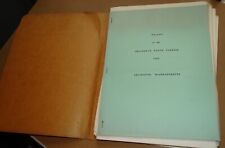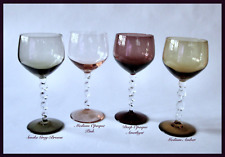When you click on links to various merchants on this site and make a purchase, this can result in this site earning a commission. Affiliate programs and affiliations include, but are not limited to, the eBay Partner Network.
sale ON THIS ITEM CLOSES SUNDAY EVENING MAY 1, 2016
THIS IS A 1 1/2 INCH CELLULOID PINBACK BUTTON IN WHAT I BELIEVE TO BE REALLY GREAT CONDITION. HOWEVER, THAT IS JUST MY OPINION. SEE PHOTOS OF FRONT AND BACK FOR CONDITION, AND YOU BE THE JUDGE.
IF YOU HAVE ANY QUESTIONS, PLEASE CONTACT ME BEFORE offerDING OR BUYING.
GUARANTEED AUTHENTIC AND ORIGINAL.
This pin was issued circa 1963 - 1964 in support of black voter registration efforts in Mississippi and for the formation of a Freedom Democratic Party ( FDP ), eventually the Mississippi Freedom Democratic Party. The pin has the party initials and reads ONE MAN ONE VOTE.
The Student Nonviolent Coordinating Committee(SNCC) one of the most important organizations of the Civil Rights Movementin the 1960s, playeda major role in the Freedom Summer project, and the MississippiFreedom Democratic Party. (See related Student Nonviolent Coordinating Committee ( SNCC ) PIN being saleed)Buildingthe MFDP was a major thrust of the FreedomSummer project. After it proved to be impossible to register black votersagainst the opposition of state officials, Freedom Summer volunteers switchedto building the MFDP using a simple, alternate process of signing up partysupporters that did not require blacks to openly defy the power structure bytrying to register at the courthouse or for blacks and poor whites to take acomplex and unfair literacy test. By theend of August 1964 the Mississippi Freedom Democratic Party had gained so muchattention nationally that its delegates had 80,000 members belonging to theirracially integrated party.This underground pinback button pin or badge relates to the Hippie (or Hippy) Counterculture Movement of the psychedelic Sixties (1960\'s) and Seventies (1970\'s). That movement included such themes and topics as peace, protest, civil rights, radical, socialist, communist, anarchist, union labor strikes, drugs, marijuana, pot, weed, lsd, acid, sds, iww, anti draft, anti war, anti rotc, welfare rights, poverty, equal rights, integration, gay, women\'s rights, black panthers, black power, left wing, liberal, etc. progressive political movement and is guaranteed to be genuine as described.The Deacons emerged as one of the first visible self-defense forces in the South and as such represented a new face of the civil rights movement. Traditional civil rights organizations remained silent on them or repudiated their activities. They were effective however in providing protection for local African Americans who sought to register to vote and for white and black civil rights workers in the area. The Deacons, for example, provided security for the 1966 March Against Fear from Memphis to Jackson, Mississippi. Moreover their presence in Southeastern Louisiana meant that the Klan would no longer be able to intimidate and terrorize local African Americans without challenge. The strategy and methods that the Deacons employed attracted the attention and concern of the Federal Bureau of Investigation (FBI), which authorized an investigation into the group’s activities. The investigation stalled, however, when more influential black power organizations such as US and the Black Panther Party emerged after the 1965 Watts Riot. With public attention, and the attention of the FBI focused elsewhere, the Deacons lost most of their notoriety and slowly declined in influence. By 1968 they were all but extinct. In 2003 the activities of the Deacons was the subject of a 2003, “Deacons for Defense.” - See more at: July 10, 1964, a group of African American men in Jonesboro, Louisiana led by Earnest “Chilly Willy” Thomas and Frederick Douglas Kirkpatrick founded the group known as The Deacons for Defense and Justice to protect members of the Congress of Racial Equality (CORE) against Ku Klux Klan violence. Most of the “Deacons” were veterans of World War II and the Korean War. The Jonesboro chapter organized its first affiliate chapter in nearby Bogalusa, Louisiana led by Charles Sims, A.Z. Young and Robert Hicks. Eventually they organized a third chapter in Louisiana. The Deacons tense confrontation with the Klan in Bogalusa was crucial in forcing the federal government to intervene on behalf of the local African American community. The national attention they garnered also persuaded state and national officials to initiate efforts to neutralize the Klan in that area of the Deep South. The Deacons emerged as one of the first visible self-defense forces in the South and as such represented a new face of the civil rights movement. Traditional civil rights organizations remained silent on them or repudiated their activities. They were effective however in providing protection for local African Americans who sought to register to vote and for white and black civil rights workers in the area. The Deacons, for example, provided security for the 1966 March Against Fear from Memphis to Jackson, Mississippi. Moreover their presence in Southeastern Louisiana meant that the Klan would no longer be able to intimidate and terrorize local African Americans without challenge. The strategy and methods that the Deacons employed attracted the attention and concern of the Federal Bureau of Investigation (FBI), which authorized an investigation into the group’s activities. The investigation stalled, however, when more influential black power organizations such as US and the Black Panther Party emerged after the 1965 Watts Riot. With public attention, and the attention of the FBI focused elsewhere, the Deacons lost most of their notoriety and slowly declined in influence. By 1968 they were all but extinct. In 2003 the activities of the Deacons was the subject of a 2003, “Deacons for Defense.” - See more at: July 10, 1964, a group of African American men in Jonesboro, Louisiana led by Earnest “Chilly Willy” Thomas and Frederick Douglas Kirkpatrick founded the group known as The Deacons for Defense and Justice to protect members of the Congress of Racial Equality (CORE) against Ku Klux Klan violence. Most of the “Deacons” were veterans of World War II and the Korean War. The Jonesboro chapter organized its first affiliate chapter in nearby Bogalusa, Louisiana led by Charles Sims, A.Z. Young and Robert Hicks. Eventually they organized a third chapter in Louisiana. The Deacons tense confrontation with the Klan in Bogalusa was crucial in forcing the federal government to intervene on behalf of the local African American community. The national attention they garnered also persuaded state and national officials to initiate efforts to neutralize the Klan in that area of the Deep South. The Deacons emerged as one of the first visible self-defense forces in the South and as such represented a new face of the civil rights movement. Traditional civil rights organizations remained silent on them or repudiated their activities. They were effective however in providing protection for local African Americans who sought to register to vote and for white and black civil rights workers in the area. The Deacons, for example, provided security for the 1966 March Against Fear from Memphis to Jackson, Mississippi. Moreover their presence in Southeastern Louisiana meant that the Klan would no longer be able to intimidate and terrorize local African Americans without challenge. The strategy and methods that the Deacons employed attracted the attention and concern of the Federal Bureau of Investigation (FBI), which authorized an investigation into the group’s activities. The investigation stalled, however, when more influential black power organizations such as US and the Black Panther Party emerged after the 1965 Watts Riot. With public attention, and the attention of the FBI focused elsewhere, the Deacons lost most of their notoriety and slowly declined in influence. By 1968 they were all but extinct. In 2003 the activities of the Deacons was the subject of a 2003, “Deacons for Defense.” - See more at: July 10, 1964, a group of African American men in Jonesboro, Louisiana led by Earnest “Chilly Willy” Thomas and Frederick Douglas Kirkpatrick founded the group known as The Deacons for Defense and Justice to protect members of the Congress of Racial Equality (CORE) against Ku Klux Klan violence. Most of the “Deacons” were veterans of World War II and the Korean War. The Jonesboro chapter organized its first affiliate chapter in nearby Bogalusa, Louisiana led by Charles Sims, A.Z. Young and Robert Hicks. Eventually they organized a third chapter in Louisiana. The Deacons tense confrontation with the Klan in Bogalusa was crucial in forcing the federal government to intervene on behalf of the local African American community. The national attention they garnered also persuaded state and national officials to initiate efforts to neutralize the Klan in that area of the Deep South. - See more at: IS MY HOBBY AND IS NOT A BUSINESS. THIS AND MY OTHER ITEMS ON ARE FROM MY PERSONAL COLLECTIONS AND WERE NOT INITIALLY ACQUIRED BY ME FOR RESALE. PROCEEDS GO TO BUY OTHER STUFF I AM INTERESTED IN COLLECTING.
I AM A MEMBER OF A. P. I .C. (AMERICAN POLITICAL ITEMS COLLECTORS). IF YOU ARE NOT A MEMBER, YOU SHOULD CONSIDER JOINING. IT IS AGREAT ORGANIZATION!
SHIPPING: ITEMS WILL BE SAFELY PACKED TO AVOID DAMAGE DURING SHIPPING. ITEMS ARE SHIPPED BY FIRST CLASS MAIL, ITEMS ARE SHIPPED WITHIN A BUSINESS DAY OR TWO OF RECEIPT OF PAYMENT.
SHIPPING TO DESTINATIONS WITHIN THE UNITED STATES BY FIRST CLASS MAIL IS $3.50.
IF YOU WOULD LIKE YOUR ITEMS SENT BY PRIORITY MAIL INSTEAD, PLEASE LET ME KNOW BEFORE PAYING SO I CAN SEND YOU AN INVOICE FOR THE INCREASED AMOUNT.
OUTSIDE THE UNITED STATES, SHIPPING IS $15.00 FOR FIRST CLASS MAIL.
IF YOU WOULD LIKE YOUR ITEMS SENT BY INTERNATIONAL PRIORITY MAIL INSTEAD, PLEASE LET ME KNOW BEFORE PAYING, SO I CAN SEND YOU AN INVOICE FOR THE INCREASED AMOUNT (APPROX $30).
I WILL REDUCE SHIPPING CHARGES ON MULTIPLE ITEMS. Depending on the size, I usually charge an additional $ .50 (fifty cents) per item. ALL I ASK IS THAT YOU LET ME KNOW YOU WOULD LIKE A COMBINED SHIPPING PRICE BEFORE PAYING SO I CAN INVOICE YOU WITH THE REDUCED SHIPPING COSTS.
THANK YOU FOR YOUR INTEREST.







